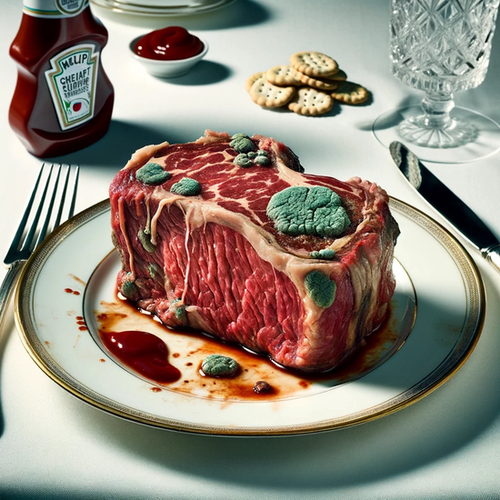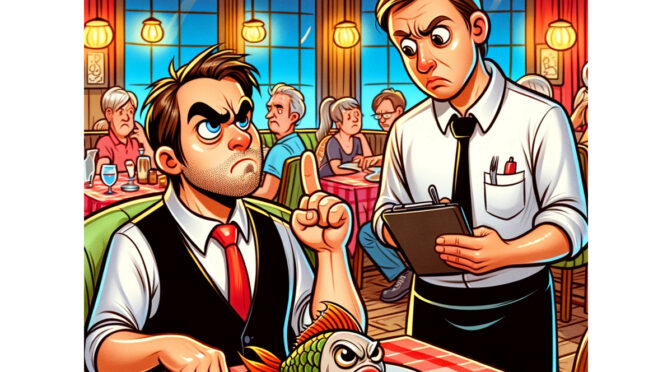By Robin Garr
LouisvilleHotBytes.com
Your steak is too well-done for your liking. It’s dry, tough, and leathery. Your partner’s tenderloin is too rare for their liking. It’s dripping bloody juices that make them go “ick.” You find dirt in your dish. Mold in your dish. A hair, or several!
Grossed out by now? You haven’t heard anything yet. You find a dead cockroach in your potatoes. Or even a live parasite squirming in your swordfish.
And how about that time you told the server about your kid’s allergy and got a dish that triggered it anyway?
Just how bad does a problem have to be before you can reasonably ask a server to take your plate back to the kitchen for replacement or repair?
“It’s fair to want to get your money’s worth, especially since dining out feels like an investment these days,” Li Goldstein wrote in her article, How to Send a Dish Back Without Making Your Waiter Hate You, in the Feb. 2, 2024 issue of Bon Appetit.
“Whether your meal is really salty, really cold, or just really disappointing, there are right and wrong ways to send it back,” Goldstein added. “But if you, like me, consider yourself non-confrontational to a fault, sending food back can be a scary prospect.”

“I’m actually afraid to send food back”
Some frequent diners consider this fear well founded. “I’m actually afraid to send food back,” said a friend in a social media conversation, “because of the horror stories I’ve seen videos of or heard people say what they’ve done to customer’s food.”
Another friend made that fear explicit: “I’m always too afraid to [send a dish back]. Even if it tastes like garbage, I know the first meal is spit-free.”
Friends in the service industry, servers and chefs alike, say there’s little reason to fear such extreme measures. Contaminating a patron’s food would open a restaurant to litigation and a server to immediate firing. It’s just not good business.
“I will always replace something a guest doesn’t like.” said Richard Blaine Doering, the owner and chef at Legacy Pizza and Bakery in New Albany. “We are in the service industry.” But, he added, “Being a chef I do not like it when the customer knows nothing about the dish they ordered. Ask the server if you are unsure. My biggest gripe would be someone complaining about something days later on social media or giving us a review concerning something they nothing about. We fix every issue immediately.”
That’s admirable, and it helps explain why I am more than willing to cross the Mighty Ohio for a taste of Legacy’s pizza and artisanal breads.
Queasy yet? Horror stories
But it’s a wide world out there, with a lot of variety. Ask a few foodies to tell you horror stories, and you’ll get an earful, and maybe a queasy feeling.
Let’s consider a few compelling examples from my social media orbit.
“My broccoli soup came with a wad of gum stuck to the side of the bowl. The server was embarrassed when I pointed it out. Heard yelling when he took it back. I didn’t order a replacement. They took it off the check. I think my meal should have been comped since I was afraid to eat my sandwich.”
“I pulled a twist tie out of my mouth while eating pasta, and the restaurant didn’t comp my meal. It was my birthday, so the least they could have done was offer free dessert.”
“I had broken glass in risotto once from a ‘major’ local restaurant. They didn’t care. … Nothing like paying three digits for a meal for two and wondering how much broken glass you swallowed.”
In fairness, other friends, particularly those with experience in the hospitality business, tend to be more casual. “Very rarely do I ever,” one said. “Ordinarily I don’t look that closely at a plate. I’m there to eat, not complain about the presentation.”
“A roll of the dice”
Another friend with a background in the kitchen and restaurant ownership offered blunt thoughts: “I’ve never sent a dish back. For me it’s a roll of the dice. Even the best kitchens and chefs in the finest restaurants can have an off night for whatever reason. If it consistently sucks, I just won’t return. If it’s actively bad I just won’t recommend it to my friends and might make some suggestions to the owner/chef. Then again, if it’s that bad, it probably won’t be around too long anyway.”
A onetime server had plenty of stories to tell, like the time she served a baked cod dish with the fish frozen solid. “The customer was very nice,” she recalled. “I was horrified. I took it to the owner and he comped the table and fired the drunken cook.”
Another time a businessman at a working lunch “pulled a cockroach out of his mouth after taking a drink of his iced tea. They called me over and were all laughing! When they showed me the roach I almost burst into tears. One of the guys said, ‘Don’t worry, he eats roaches all the time.’ Again the owner comped the table.”
Her good advice in the aftermath of that story makes sense for us all: “It is always better to be kind than to be an asshole. And please don’t punish the server if it is obvious the mistake was not their fault.”
Richard Blaine Doering at Legacy Pizza wrapped up his thoughts with similar counsel: “As far as sending food back, I rarely do it and do not complain unless asked. I never leave bad reviews because I know how hard it is to own and operate a business. .. Mistakes cost money and we try to prevent them. Bad experiences cost money as well. Even when we go out of our way to make amends people still are unhappy. You can’t please everyone, just do all you can and move on knowing we did all we could.”




